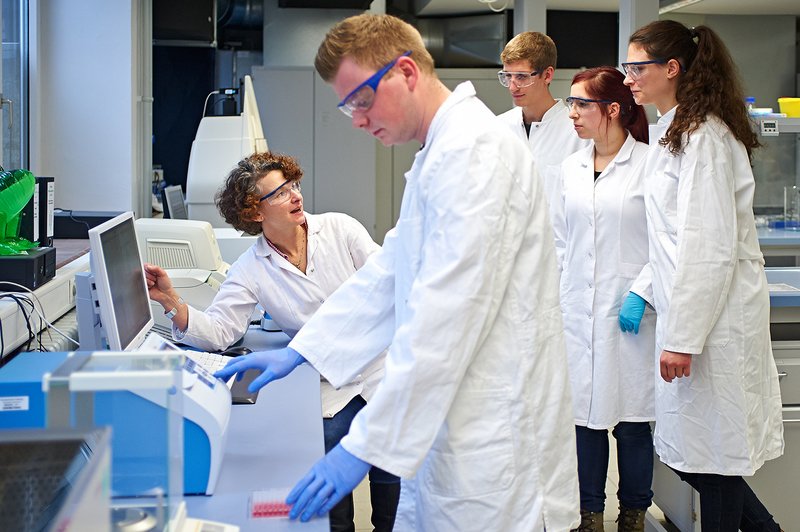
Bioanalysis
In A Nutshell
Profile
How do you create a genetic finger print? How do scientists perform doping analysis? These are the questions that are dealt with in the bioanalysis program. Students learn the scientific-technical methods that are well-established in bioanalysis and they are optimally prepared for professional practice.
The bioanalysis program conveys well-founded knowledge in biology, physics / chemistry, and analytics. Students familiarize themselves in depth with various chemical-biological analysis procedures. This enables them to study biological samples, such as blood, enzymes, and hormones. The analysis of heavy metals in ecosystems or doping analysis also lie within their scope of responsibilities. This way they acquire a high level of analytic competence.
International scientific language
Since English is the international scientific language, the bioanalysis program has integrated at least one technical lecture in English into every semester. This allows the students to become familiar with the international scientific language.
Practical Training
Projects
The program is designed specifically for the requirements of professional practice. While working in the lab and in different projects, students apply their theoretical knowledge to practical problems from the start. The projects also allow them to develop contacts for their professional careers early on.
Required internship semester
The required internship semester usually takes place in the fourth semester of the program. It spans a contiguous period of 20 weeks. In addition, students will visit educational events to accompany their practical training.
Structure of the Program
The program focuses on:
- In biology: biology, microbiology, molecular biology / gene technology, biochemistry, food chemistry, pharmacology / toxicology
- In methodology: biophilosophy, mathematics, computer science
- In chemistry and analytics: general, inorganic, and organic chemistry, physical chemistry, stoichiometry, analysis (elements, molecules, environment, clinic, forensics)
Independent study is very important for students in this academic program. In order to promote independent and self-directed learning, the in-class times for students in lecture halls become shorter and shorter over time.
External content
Curriculum and Examination Regulations
The [modul plan] provides an overview of the structure of the study program. The [modul handbook] provides information about the contents of the individual modules. And the d[study and examination regulations] form the legal basis of the studies. Questions about the contents of the study program can be answered by the study advisor Dr. Klaus Horbaschek.
Job Perspective

Bioanalysis is one of the big growth industries on the international level. For example Germany has a strong chemical industry with a long tradition as well as modern, often medium-sized businesses in bio- and environmental technology. The demand for technical and management staff in bioanalysis will thus continue to grow.
Bioanalysis graduates can potentially work in the biotechnology, chemical and pharmaceutical industries, clinical and veterinary medicine, or in the fields of food chemistry, toxicology, environmental chemistry or environmental technology.
Master's degree
After completing their degree, Coburg University students have the opportunity to continue their studies with a suitable Master's program. The university offers the Master's program in bioanalysis which connects directly with the Bachelor’s program.
Application and Admission Requirements
Here you can find all the important information about evaluating your school-leaving certificates and learning German in order to start a bachelor program at the University of Coburg.
Since the program is taught in German, you also have to prove your knowledge in German before the start of studies (level C1/C2).
